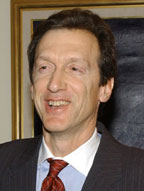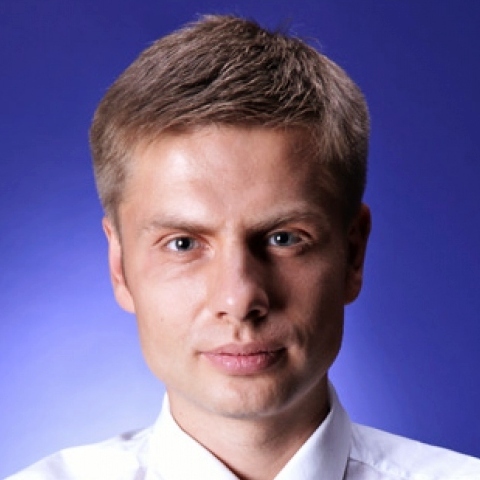This first interview was conducted by NCSEJ Executive Director Mark Levin on February 6 in Washington, D.C., with Alexey Goncharenko, 34, a newly elected member from Odesa of the Verkhovna Rada [Ukraine's parliament].
 |
|
Mark Levin, NCSEJ
|
The War in the East
Mark Levin: The violence and destruction in the East has created special problems for the rest of Ukraine. We know that there are a million displaced people, that the military costs have overwhelmed [efforts] trying to help citizens in need. How has the conflict impacted the daily life of the average Ukrainian? |
Verkhovna Rada MP
Alexey Goncharenko |
Alexey Goncharenko: I think the whole country, and every Ukrainian's economic situation, now, is awful. We are suffering. All people feel it, with no exceptions.
But the biggest problem is in Crimea and in Donbas, in the Donetsk and Luhansk regions, because there, people are dying. There, people are killed. There, people suffer from hunger. There, people cannot receive medical aid.
And as a member of the Rada, as part of the government, what is it trying to do now to alleviate some of the suffering, not only in the East, but elsewhere?
Unfortunately, Ukraine is not controlling, at the moment, parts of the Donetsk and Luhansk regions, and it's almost impossible for us, the government, to help people who live there. This territory is under control, in reality, of Russia. According to all international law and international practice, the responsibility for those who live there is on the aggressor, because they control this territory for the moment.
Old people from these territories controlled by terrorists and Russians can go to the cities closest to them which are controlled by Ukraine, and receive there their pensions, or their social reimbursements, or medical care. Also, we have thousands and thousands of internal refugees, and we try to settle them in new places and try to give them everything they need.
Are you satisfied with the assistance from the West and some international organizations?
No. It's hard to be satisfied in this situation, but I think not enough is being done by international organizations. Even in the Ukraine Freedom Support Act, which was adopted by the [U.S.] House and Senate, and was signed by President Obama, there are deadlines about refugees, what can be done for refugees and so on, which are being broken, and we think that it's not a good signal. So, we think that much more can be done.
Goncharenko on Anti-Semitism, Corruption
Over these past very difficult months, there's been scant evidence of anti-Semitic rhetoric or anti-Semitic incidents. Watching the situation closely, I think [the overstatement of anti-Semitic incidents in the conflict] has been one of the major misimpressions outside of Ukraine. Why do you think that is, and what do you think the government can do to ensure that there isn't a spike in anti-Semitism?
First of all, anti-Semitism and hate crimes are absolutely unacceptable, in Ukraine and elsewhere. I don't observe any real problems in Odesa, for example, or Kyiv. Maybe I don't know something, but at the moment, I haven't observed any.
Ukraine is a multinational, multicultural country, which honors its Jewish community and Jewish culture. For example, one of the presidential candidates was Mr. Rabinovich, a leader of the Jewish community. He received more votes in Ukraine than the two ultra-right parties together.
I heard different things from the leaders of terrorists [pro-Russian separatists], for example, Zakharchenko and some others. They are saying that everything happening in Ukraine is an American Zionist conspiracy.
NCSEJ issued a strong statement condemning the recent [anti-Semitic] statements by the two separatists.
Yes. It's not a solitary example. It's the way of thinking of many people who are active now in these terroristic organizations.
One area that we hear much about in the United States, and when I travel to Europe, is dealing with corruption, and creating a real rule of law.
We are on the way to reform in our country. We are very close, finally, to creating a National [Anti-] Corruption Bureau. The law has been adopted, and now the head of the bureau [is being chosen]. And other things are being done; it's a high priority, a top priority for us.
A Message to the United States
What was your message to the U.S. officials who you met with on this visit?
I brought two key messages. First, it's perfectly clear that there is Russian aggression against my country. We desperately need help from the United States. We especially need weapons.
Second, there is an information war not less important than the "real" war. We have several propositions. For example, we propose that Radio Svoboda [a U.S. government-funded, Russian-language broadcaster] move from Prague to Ukraine, to influence international leaders and public opinion. I think that would be a good signal that what has been done to Ukraine by Putin is unacceptable.
And if there's one message you could share with the American public today?
First, what is happening in Ukraine is about the whole world. Mr. Putin is trying to rebuild the Soviet Union, with all the evil ideologies that were inside the Soviet Union, including suppression of all minorities (religious, ethnic), anti-Semitism, and so on.
People in Ukraine, they're standing not only for our independence, but they're standing for the values which they share with the American people, and with people in all civilized countries over the world. That's very important. So when the governments and people of different countries are helping Ukraine, they are helping themselves, too.
And the second message is more channeled to the Jewish community. We honor the Jewish community. I was born in Odesa, one of the centers of Jewish community in Eastern Europe and one of the centers of Zionism, where it was born in the 19th century. We honor our Jewish community and Jewish culture as an absolutely needed part for the completeness of Ukrainian culture, now and forever.
People in other countries and the Jewish communities around the world should not be concerned about what will happen with their brothers in our country, because they are our citizens, and they are also our brothers. That's my message to people.
This interview has been edited and condensed.